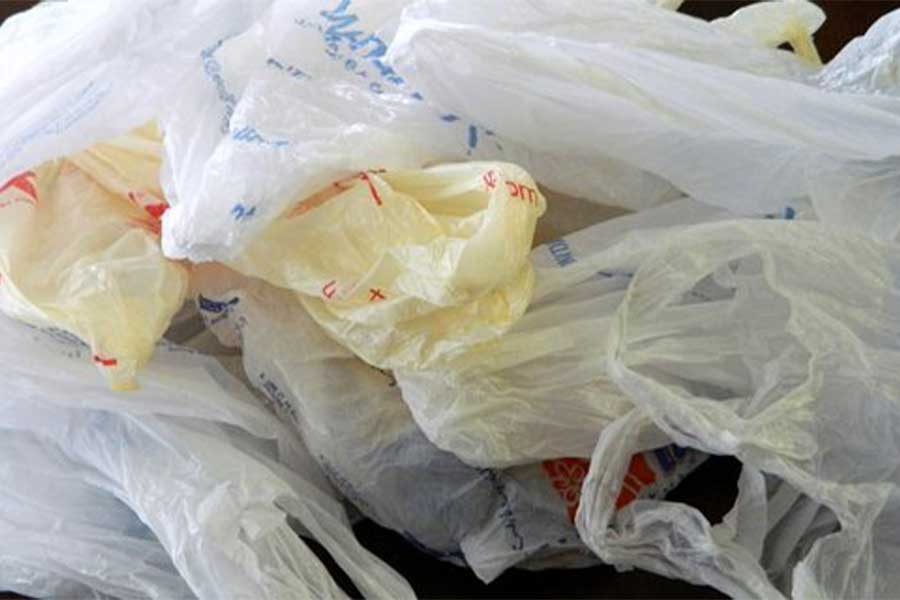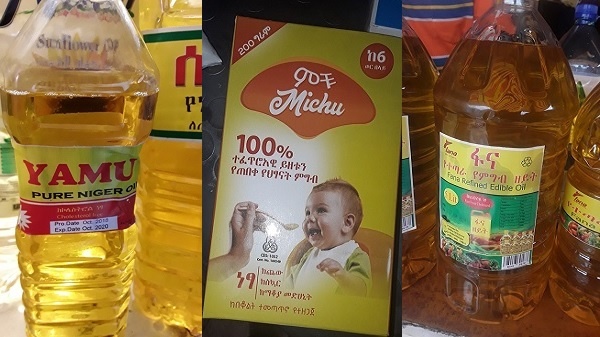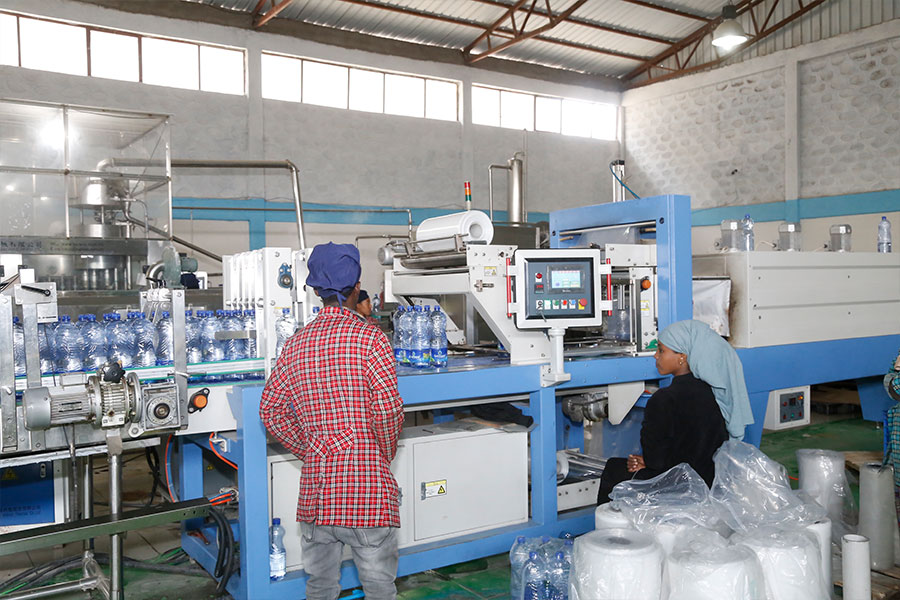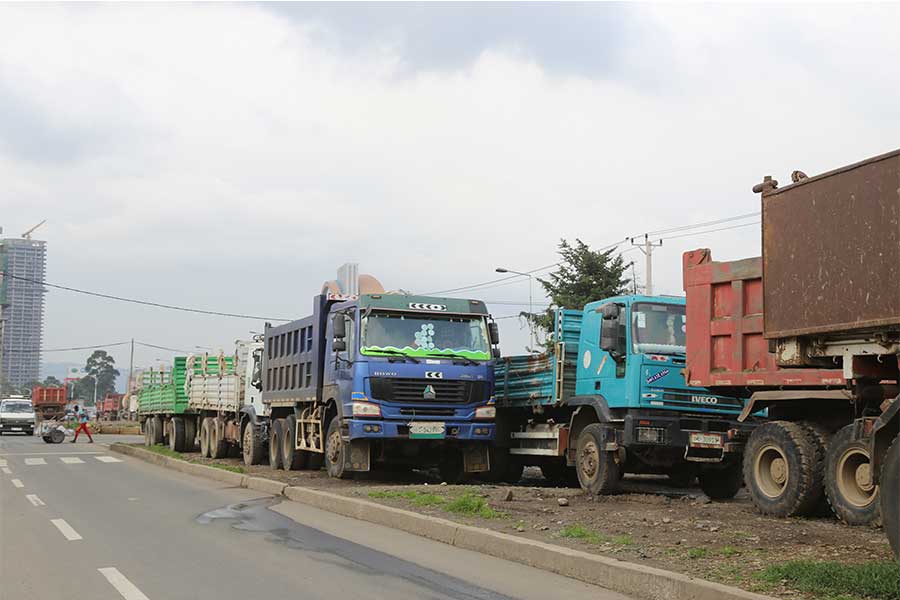
Fortune News | Jan 18,2020
Aug 17 , 2019
By YOSEPH MERGU ( FORTUNE STAFF WRITER )
Due to improper labeling, the federal government’s Food & Drug Administration has banned more than 103 food items in the last fiscal year. Many manufacturers have been caught off guard by bans and say that consumers incorrectly assume there is a health issue with their products, but the Administration says they were only following up on complaints from consumers, reports YOSEPH MERGU, FORTUNE STAFF WRITER.
 The food products that are banned do not necessarily have health or quality issues. They are banned just because they do not have the all required information set by the government on their labels.
The food products that are banned do not necessarily have health or quality issues. They are banned just because they do not have the all required information set by the government on their labels. On a sunny Thursday at the beginning of this month, dozens of people were shopping at the Shoa Supermarket on Africa Avenue (Bole Road).
Some seemed familiar with what they are buying. They just picked up food items from the display and put them in the cart.
Others glanced quickly over what was written on the package of the items before adding them to their baskets without carefully checking the item labels.
Mahder Abebe, 30, who is married with no children, and a loyal customer of the Shoa Supermarket, was one of the visitors to the supermarket on that date.
She was there buying mayonnaise, pasta, yeast and cake flavour for her household. As many were doing, Mahder was also checking the labels of the food items she was buying.
“I only see the expiry date and the country of the manufacturer,” said Mahder.
The federal Food & Drug Administration (FDA) mandates packaged food manufacturers put labels on the products with descriptions about their production date, expiry date, level of nutrients, where the product was processed and by whom.
Some items have additional labelling and packaging requirements according to the degree of safety the items require.
It also mandates that retailers only display products on their shelves that fulfill these requirements.
Mahder was not aware of these requirements, but she roughly checked the production and expiry date of the products before she decided to buy them.
Another woman, Hanna Kena, 28, who works at Cooperative Bank of Oromia, is also neither aware of the requirements nor checked the origin of the products and details of the manufacturers.
Hanna was buying bread, macchiato powder and milk powder for office use from Friendship Hypermarket, also located on Africa Avenue, close to Bole International Airport.
The food products that are banned do not necessarily have health or quality issues. They are banned just because they do not have the all required information set by the government on their labels.
“I only see the expiry date and content concentration of the items,” she said. “I don’t have the habit of checking the manufacturers’ address place or country.”
Though users are not well aware of this, there are many packaged food items in the market displayed without any labels or labels without all the required details.
In just the last fiscal year, the Ethiopian Food & Drug Administration has banned more than 103 processed food items that have been distributed in the market without the proper label descriptions.
The Administration does not know when the products joined the market but blamed a lack of required labelling as a cause for the ban.
In two rounds, the Administration announced that it has banned food items under eight categories. The banned food types include candy, honey, table salt, peanut butter, edible oil, baby food, Vimto [a sweet tonic beverage] and vinegar.
Ayu Mixed Baby Food, which has been producing food for children for the past six years, is one of the items banned by the Administration.
Ayu is one of the 369 food manufacturers registered under the Administration, which has branches in the capital as well as in Jimma, Bahir Dar, Meqelle, Kombolcha, Hawassa and Dire Dawa.
Ayesanesh Birru, the owner of the company, says that she learned of the ban on social media and did not receive any prior warning from the Administration.
“I saw the ban on Facebook,” Ayesanesh told Fortune.
Ayesanesh says that her customers are concerned, falsely believing that products she sells are harmful. She adds that she explains to her customers what is really happening.
“Some understand us, and some don’t,” she said, “Some customers don’t trust me anymore.”
On the packaging, Ayu Mixed Baby Food lists 14 food items that the product is made from and for how long it should be boiled before use. But it does not have the origin of the product nor details of the manufacturer.
“It would have been better if the government notified us before the ban and gave us some time to improve,” she said. “It is a big crisis for us, and we don’t have a clue what to write on the package.”
After the ban, the government told the companies they require to list protein and carbohydrate concentration of the product, and they will examine their product and working environment to give them a permit to re-join the market, according to Ayesanesh.
Another company that was banned manufactures salt and vinegar. Established by five siblings, who have returned from abroad to invest in Ethiopia, the company is in the business for the past decade and a half.
“They just banned us without any warning,” said one of the owners who requested to remain anonymous. “We perform annual laboratory tests for our salt product, but they told us that they didn’t have a standard for vinegar.”
The owner explains that the Administration requires them to hire a certified salt degrader and a laboratory chemist. They were also told to prepare toilets and dressing rooms for both genders for our employees.
“How could we find a certified salt degrader? How could a small business like us hire a chemist?” she questions with frustration.
“It is very discouraging that things went against our expectations,” she adds, “My children blamed my decision to work in my country. I wouldn’t mind if this had happened to me abroad.”
The Administration still argues that the food items were banned not because they are found to be dangerous for the consumer but for failing to meet the compulsory requirements and standards.
“Even if they meet the requirement of conformity assessment,” said Betre Getahun, food institution inspection director at the Administration, “they must fulfill Compulsory Ethiopia Standard, which mandates standards for packing and labeling.”
Before issuing a certificate of competence for new businesses, the Administration checks whether the environment of the manufacturing area is suitable to manufacture food items. For example, producing food is forbidden if there is a cement factory in the area.
Standard for their manufacturing set up, the procedure the manufacturers follow when they receive raw materials and their origin, hygienic practices, their employee hiring method and some other safety issues are also examined by the Administration.
The Administration classifies food products as higher, medium and lower based on their moisture concentration and the degree of risk they might cause to the health of consumers. Milk is a high-risk food, because it cannot stay more than a week in a fridge, while dry foods are categorised as low-risk.
For manufacturers, the Authority has three categories: manufacturers with capital of 1.5 million Br are categorised as low; those with capital between 1.5 million Br and 20 million Br, as medium; while those with capital of over 20 million Br, as high.
Once companies obtain a license, their products are annually examined and checked by the Administration to ensure their consistency in meeting the Conformity Assessment Standard.
Apart from the annual checks, the Administration conducts sudden surveys when deemed necessary and receives complaints from consumers year round.
The recent ban also came after a survey that was conducted by the Administration following complaints from consumers that there are unlabeled food items in the market, according to Betre.
Ahead of the ban, the Authority had conducted a four-week survey by its inspectors at shops and supermarkets across the city. The survey showed that 80pc of the food items are circulated and distributed in Merkato, the largest market in Ethiopia.
Out of the 103 banned food suppliers, 10 came to the Administration and lodged complaints.
As of now, the Administration plans to conduct a survey every month and take the manufacturers without labels to court along with banning the products, according to Betre.
Aynadis Tamene (PhD), a lecturer and microbiologist at Addis Abeba University’s School of Food, Science & Nutrition, agrees with the Administration, saying that every food item should have the Compulsory Ethiopian Standard Authorization.
“Consumers have the right to know the concentration of the content, the place of origin and the expiry date of packaged food products,” he said.
According to him, meeting the Conformity Assessment Standard is not enough. They must also be labelled and packed consistent with the standards of the Administration.
However, Aynadis does not agree with the move of the Administration in banning the products without giving warnings to the manufacturers.
PUBLISHED ON
Aug 17,2019 [ VOL
20 , NO
1007]

Fortune News | Jan 18,2020

Fortune News | Oct 31,2020

Fortune News | Dec 10,2022

Agenda | Apr 02,2022

Radar | Oct 05,2019

Fortune News | May 15,2024

Fortune News | Feb 01,2020

Fortune News | Feb 29,2020

Agenda | Jul 20,2019

Radar | Jan 04,2020

Dec 22 , 2024 . By TIZITA SHEWAFERAW
Charged with transforming colossal state-owned enterprises into modern and competitiv...

Aug 18 , 2024 . By AKSAH ITALO
Although predictable Yonas Zerihun's job in the ride-hailing service is not immune to...

Jul 28 , 2024 . By TIZITA SHEWAFERAW
Unhabitual, perhaps too many, Samuel Gebreyohannes, 38, used to occasionally enjoy a couple of beers at breakfast. However, he recently swit...

Jul 13 , 2024 . By AKSAH ITALO
Investors who rely on tractors, trucks, and field vehicles for commuting, transporting commodities, and f...

Oct 11 , 2025
Ladislas Farago, a roving Associated Press (AP) correspondent, arrived in Ethiopia in...

Oct 4 , 2025
Eyob Tekalegn (PhD) had been in the Governor's chair for only weeks when, on Septembe...

Sep 27 , 2025
Four years into an experiment with “shock therapy” in education, the national moo...

Sep 20 , 2025
Getachew Reda's return to the national stage was always going to stir attention. Once...